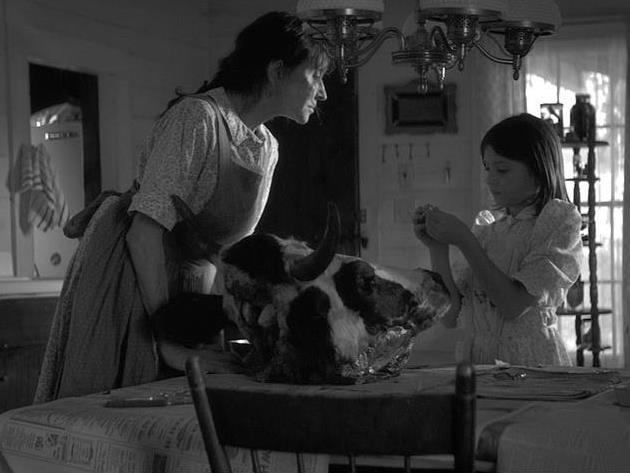Diana Agostini and Olivia Bond in The Eyes of My Mother. Photograph via Melbourne International Film Festival.
‘Loneliness can do strange things to the mind,’ a woman (Diana Agostini, The Eyes of Van Gogh) tells her daughter (newcomer Olivia Bond) in the early moments of The Eyes of My Mother. By the time the film throws its final sequences on to the screen, writer/director/editor Nicolas Pesce’s debut feature has firmly established an unrelenting tone of unease. With every aesthetic aspect of the black-and-white effort designed to elicit the greatest impact, watching the gothic thriller becomes an exercise in not just parsing its sparse narrative, but enduring its menacing mood.
Soon after such words of wisdom about the dangers of solitude are spoken, young Francisca is set on the path to discovering just what her mother really means. In the first of the movie’s three chapters, a stranger (Will Brill, TV’s The OA) arrives at their farm, commits a horrific act and is chained up in their barn as punishment. Next, Francisca plays house with her father (first-timer Paul Nazak), settling into their version of normality. Finally, as a grown woman (Kika Magalhaes, Welcome Home) left in her home alone, she starts to find an outlet for her inner urges – and endeavours to construct a new family.
Seeing Francisca’s sheltered world through her eyes isn’t the film’s primary aim; watching and waiting as the violence that changed her childhood starts to manifest into her adult motivations. And understanding why the isolated figure chooses her particular path. With confined captives treated as pets, surgical dissections, several deaths and a kidnapping all included in Pesce’s story, The Eyes of My Mother doesn’t try to elicit sympathy for its protagonist. Rather, it plunges viewers into a world of dread, loss, pain, and uncertainty that shows no signs of abating, aka Francisca’s psychological and emotional realm.
Indeed, as the older version of the feature’s overtly formidable yet unmistakably fragile lead character, the entrancing Magalhaes provides a finessed display of internalised hurt and grief with fuelling fits of externalised aggression. Pesce doesn’t make any attempt to force Francisca to adhere to a certain type – victim, killer, deluded, and lucid among them –and neither does his main actress. Hers is a layered performance that effectively conveys different states of both trauma and torment with little more than the flicker of an eye across a passive face, while still ensuring every look and gesture equally furthers and fits into the unsettling atmosphere.
In fact, The Eyes of My Mother‘s central portrayal crawls under the viewer’s skin and demands attention in the same way as the surrounding film: through precision and control that allows the feature’s disarming levels of discontent to seep through. That’s Pesce’s modus operandi as a filmmaker, whether he’s playing with the focus of his monochrome visuals, framing the perspective from a child’s vantage, or choosing to cut away from the most shocking scenes at pivotal moments.
Cinematographer Zach Kuperstein (5 Doctors) and composer Ariel Loh follow the helmer’s lead to the letter, resulting in a movie that’s decidedly nightmarish and lyrically dreamlike all at once. It’s little wonder that the feature conjures up memories of many great genre efforts of the past – both of the grisly serial killing and more cerebral and contemplative variety – not simply as a way of wearing its inspirations on its sleeves, but as a homage intent on weaving its influences into its mesmerising and melancholy brand of horror brooding.
Rating: 4 stars out of 5
The Eyes of My Mother
Director: Nicolas Pesce
USA 2015 76 mins
Melbourne International Film Festival
28 July – 14 August 2016
Actors:
Director:
Format:
Country:
Release:





